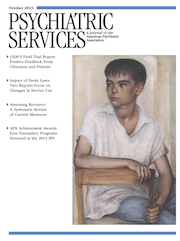To the Editor: A patient page is a document describing a disease in easy-to-understand, layperson’s terms. It is considered important in motivating patients and their relatives to engage in treatment (
1). Patient pages are distributed widely in many areas of health care, but as Thomas Goetz (
2) suggested in his recent book, their value would be greatly improved if the information was placed in the context of the patient's personal clinical data. As such, patients would arguably become more engaged in their own treatment, more motivated to take responsibility, and more satisfied with doctor-patient communication.
The idea of a personalized patient page is fairly new, and until now it has not been applied to the treatment of persons with mental illness. With this in mind, we developed an example of a personalized patient page for a fictional patient with depression. [The sample page is available as an online
data supplement to this letter.] When the page is implemented in the clinic, we envisage that it would be generated automatically when results from an examination are recorded in the patient’s file. Furthermore, the page could be delivered to the patient’s e-mail inbox or smartphone application, and the page could have an interactive design. For example, if the patient wishes to clarify or know more about “minor depression,” he or she would click on that term and the relevant information would be displayed. We expect that the main barrier to implementation will be the development of software that can find information in the patient file and copy it to the appropriate places on the patient page.
We believe that this personalized patient page will empower and motivate patients to take control of their mental health. According to Daniel Pink (
3), motivation comes with autonomy, mastery, and purpose. The personalized patient page that we have designed will contribute to the goal of motivating patients by helping them understand the severity of their depression, what it means to them, and what they can do to combat it. Making the patient’s health profile more individual, present, tangible, and straightforward will clarify the purpose of treatment. Second, providing patients and their relatives with information that they understand and will remember provides a foundation for engaging in treatment. Third, as health care professionals encourage patient autonomy by relinquishing part of their sovereignty in regard to treatment, patients are more likely to take control of their own health. Finally, a patient page may prevent misunderstandings during doctor-patient communications and provide needed additional information.
In conclusion, we predict that implementing a personalized patient page in the treatment of persons with mental illness will promote patient engagement in treatment, motivate patients to take responsibility, and lead to greater satisfaction with patient-doctor communication.
Acknowledgments and disclosures
The authors report no competing interests.

